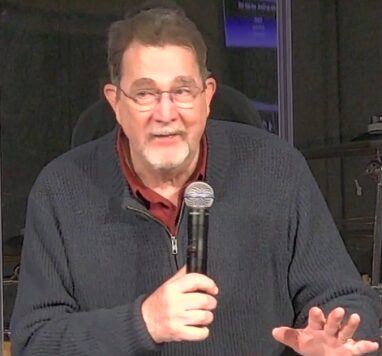
Tom Gilson, senior editor for The Stream, is convinced that Evangelicalism is besieged by a hostile, anti-Christ culture. Although I’m in no position to deny that cultural antagonism to mainstream Christianity is a real thing, there may be some more mundane explanations for why he’s feeling so out of sorts.
Reading Gilson in The Stream is always frustrating.
Maybe part of the reason is that somewhere behind the droning riffs of his middle-age rage and fear-mongering, I think there might be a decent guy with a decent brain. His modes and solos vary a bit, but his theme is always straight out of the Great Evangelical Songbook: “The Enemy is Always Without, Never Within”.
Mourning the Loss of Influence
In his most recent piece, Gilson sees Christianity– or at least his form of modern Evangelicalism– in a terminal decline.
On that point alone, he’s absolutely right– as I posted last week. The polling data about the de-Churching of America is pretty damning.
But he goes further. In his estimation, Christians once held the venerable seats of dominion in society and now they’re relegated to fold-out chairs at the kiddie table.
Christians speak, he readily admits, but they no longer “hold the microphone”—i.e. control “the airwaves, the universities, the big social media sites, where influence abounds”. Gilson acknowledges that he has the freedom to preach his gospel message, but he’s not satisfied with that. He wants to run the show.
This complaint is transparently revealing about the true nature of The Stream’s religion. It’s got a big chip on its shoulder, blames all its severe decline on others and badly wants dominion.
“You People-ism”!!!
For every hundred pages of The Stream’s oppositional research on Evangelicalism’s perceived enemies– Leftists, Globalists, Marxists, Satanists, Homosexuals — you will read precisely zero sentences expressing critical self-reflection on their own behavior.
In fact, light internal criticism or even the pretense of challenging The Stream’s opinions, is nonexistent.
Psychologists recognize that the ability to self-reflect and critique oneself, is a fundamental aspect of healthy human cognition.
On an interesting sidenote: in clinical practice, the complete absence of self-critical facilities is generally indicative of cognitive impairment or severe personality disorders—like psychopathy, narcissism and schizophrenia. All of us have known someone who is never, ever wrong and who is always a perceived target of sinister conspiracies designed to sabotage them. We rightly hold a measure of pity or fear for such individuals. Likewise there’s something to be said about a religion that has no capacity for self-awareness or self-reflection.
Questions about the Bible’s moral validity aside, even the prophets of the Old Testament routinely and ruthlessly criticized those within their own theocratic tribe. I always found this to be one of the most interesting characteristics of the Old Testament personalities. However, this pattern seems to have completely escaped The Stream.
A self-inflicted decline?

Gilson mourns, “Our culture has turned sharply against us”.
He goes on to mention the Three Stages of Secularization put forward by Aaron Ren, and pines for the days when being religious afforded one certain entitlements.
Gilson claims that gone are the days of what Ren called the Positive World (the U.S. prior to 1994). This was a world in which society at large retained “a mostly positive view of Christianity”. And it was an era in which being known as a Christian was an instant “status-enhancer”. Both Ren and Gilson conclude those days are sadly long gone.
If something about this smells contemptibly self-pitying and solipsistic, I don’t think you’re imagining things.
The Pew data and recent Burge/Djupe research is a clear indication that people aren’t leaving the church because they’re becoming Democrats or because they are getting turned-on to atheism or becoming gay. They are departing in droves and America is becoming less religious, for a host of equally mundane and paradoxically complex reasons. As a 20-year veteran of Evangelicalism, I simply offer a few of my own personal considerations for Gilson and The Stream’s audience. Maybe the culture has increasingly distanced itself from you because:
1. You’ve made cultural and political DOMINATION a central goal of your Christianity.
2. You’ve made peripheral cultural disagreements a matter of essential Christian doctrine.
3. You’ve made political opinions a matter of essential Christian doctrine
On this last point… David French is an outcast Evangelical columnist, professor and Iraq war vet. Just mentioning his name in most Evangelical circles, will elicit an avalanche of groans and dismissive wave-offs. He has gained this infamy by making extremely “controversial” statements like “If you learn someone shares your faith but not your politics, and you immediately distrust their faith, then your politics might be displacing your religion.”
This outlook on the non-essential nature of political opinions, along with his withering criticisms of former president Donald J. Trump, earned him a reputation as a persona non grata among the ruling class of Evangelical conservatives.
In the circles Tom Gilson works in, denying or rebuking Trump is seen as a denial of orthodoxy. Never mind those of liberal political persuasions, Christians who are also Never Trumpers are generally viewed as outright counterfeit at worst–spiritually compromised at best. At Gilson’s magazine, unity means uniformity. And anyone deviating from John Zmirak’s Deep State conspiracies and Limbaughesque misanthropy has no place in their “authentic Christianity”.
This is The Stream’s prerogative, and I don’t take issue with that per se. The site exists to reach an existing audience and make money for their televangelist founder, not provide a balanced view of culture. I do find their focus to be reflective of much broader views within American Evangelicalism and have to chuckle when disgruntled Christians like Gilson scratch their heads about the very real exodus from churches and bellyache about the lack of respect for Christianity in today’s society.


